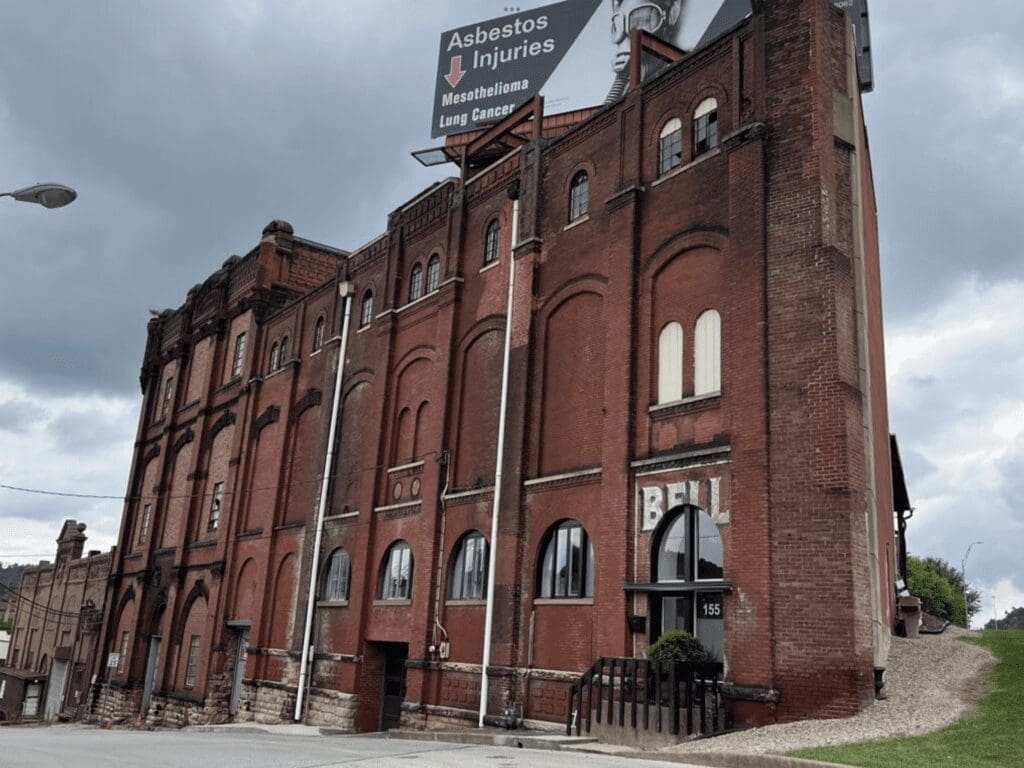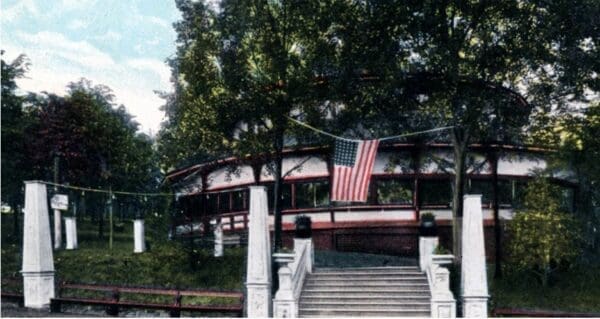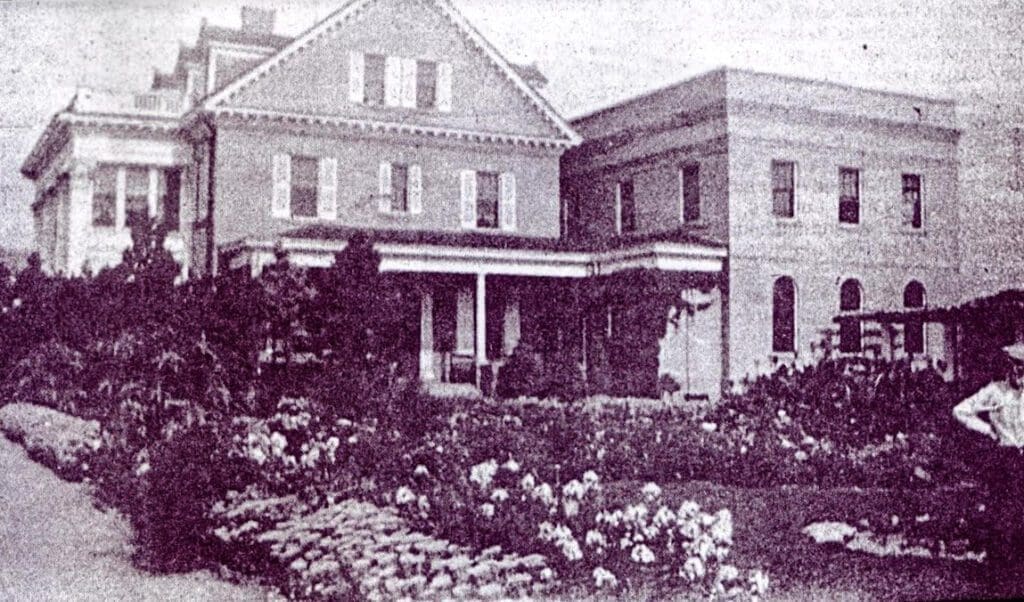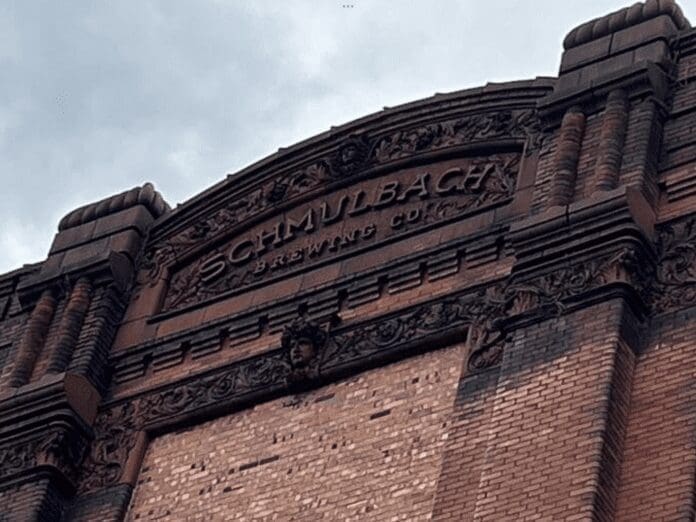He was an immigrant who had heard of the American Dream, so when he arrived to the promised land, he was ready to make his reality.
Henry Schmulbach came to Wheeling as a young child in 1852 from Germany, worked on packet boats, became involved in the wholesale liquor business, and eventually established his own brewery which rose to become one of the largest in the state of West Virginia.
Some of you may be aware that he led an interesting social life and was involved in an altercation at a tavern on Stamn’s Lane that resulted in the death of a man.
Schmulbach would later be acquitted of murder, but this added to his “reputation.”
Stay tuned, because this story will be published on the night it occurred – August 14th. The following pieces are just a few stories from the interesting rendezvouses of Henry Schmulbach.

A Bold Robbery in Wheeling
On the night of November 15, 1874 Schmulbach was involved in what the papers recalled as one of the boldest robberies to ever occur in Wheeling. Schmulbach and a group of men had attended the Knights Templar Ball that evening, but had not retired until 4:00 a.m. at the McLure House. Sometime after that, thieves sneak into the room that was shared with a man named George Swift and Schmulbach. Swift claimed to have put a pocket watch under his pillow.
Upon waking up the next morning the two men discovered that their rooms were entered while they were sleeping. The pocket watch was missing, which was valued at over $200, while Schmulbach was missing $9.00. Two other rooms were broken into that night where money and pocket watches were also stolen. When the thieves entered the 3rd room an alarm was sounded, a search was made, but as the newspaper reports, the rascals were not caught. Later the next day though two “colored” men were brought in for questioning because they had been in and out of the room occupied by Swift and Schmulbach for errands. They seemed to be the main suspects, but were later released on bail.

Schmulbach the Politician
Schmulbach always had an interest in politics at the local, state, and federal levels. He made a run for mayor in 1875, but was unsuccessful. That same year, on August 6th Schmulbach traveled to Long Branch, NJ to have a “confidential talk” with President Grant. One can only imagine what interesting topics they discussed, but this goes to show the influence that Schmulbach and Wheeling could have on the President of the United States. In 1902 Schmulbach also threw his hat in the ring and explored running for a West Virginia Senate seat, but the campaign never materialized.
Rah for Schmully!
While Schmulbach was definitely known for his “reputation” around town, he was also known for his philanthropy. In September of 1876 the Hayes and Wheeler colored guards were having some financial problems and could not afford uniforms and torches. When Schmulbach got word of this, he “came to their relief and ordered them all they wanted.” The newspaper ended the story by exclaiming “Rah for Schmully!”
In 1877 The “Healthy or Fat nine” competed with the “Invalid or Lean nine” and played in a baseball game in Wheeling. The teams consisted of well-known residents from Wheeling. Henry Schmulbach played left field for the “Healthy nine.”

Schmulbach the Gambler and 1,000 Kegs of Beer
One of Schmulbach’s hobbies was gambling, and apparently, on just about anything. In November of 1884, Schmulbach placed a bet with the President of the Elm Grove Motor Line. The bet was, if Grover Cleveland is elected, Schmulbach would tap 1,000 kegs of beer – if Cleveland lost – the Elm Grove Motor line would have to haul all passengers, free of charge to Hornbrook Park (now Wheeling Park) on a day of Schmulbach’s choosing. Cleveland would win the Presidential election of 1884, but it’s unknown if Schmulbach actually tapped 1,000 kegs of beer.
Controversy over Ice at the Brewery
In late July of 1889, four men were fired from the Schmulbach Brewing Co. for stealing ice. The workers claimed they were taking ice home that had fallen from skids; an act that most workers took part in. A meeting was held at the Trades Assembly Hall in Wheeling by the arbitration committee, members of the union, and Henry Schmulbach. Schmulbach wished to justify his firing of the employees. Another meeting was then held at the News Letter office. Schmulbach, and Hortsman (Vice President of the brewery) were present, and the room was crowded with workmen from the brewery. After a long investigation and discussion of evidence, it was decided that the workers would be reinstated and report to work on Monday morning providing that a list of rules were created to avoid future misunderstandings. Schmulbach commented that he did not want to take away privileges that workers had enjoyed in the past. Schmulbach and Hortsman also stated they wanted the union to “live and increase” because it was “to their advantage to have union men to do their work.”

Schmulbach Remembers His River Roots
In 1900 Schmulbach would again show his philanthropy by donating $1,000 to construct the Riverside Park monument. On the day it was unveiled a parade started an the McLure House and a party of about 100 people made their way to the Wheeling water front for the celebration.
Schmulbach’s Love for the Trotters
During this era Schmulbach also became one of the most prominent racehorse owners in the United States. He commonly visited the popular racetracks of the era, and was a frequent visitor of Kentucky. One example of his love for the trotters would be his purchase of the race horse Baldy McGregor for $15,000. Baldy McGregor was the fastest 3-year-old trotter in the country in 1912. Schmulbach raced the horse once where he finished first in Lexington at the Championship Stallion Stake and then sold him in a consignment sale for $16,000 in 1913, the same year he sold off all of his horses in a consignment sale. The total amount received for the consignment sale was $32,000.
Schmulbach was a man who lived an adventurous life. He was one of the keenest businessmen not only in Wheeling, but in the United States during the era that he lived. Schmulbach may have lived a rowdy lifestyle, which you will learn more about, but he was also a man of integrity and lived the American dream. His story is not only entertaining, but it’s also a story of great success and pride in a community that Schmulbach truly loved.



My great grandfather James Nicholl, worked for Henry Schmulbach, While i am not aware of all of his responsibilities I know he was responsible for collecting money for the beer purchased by Wheeling area taverns or retail sellers. My great grandfather and grandmother had two sons. According to family lore, Schmulbach offered to give the family a substantial amount of money to name one of the sons Henry. My English great grandmother refused, and the sons were given family names James and William.